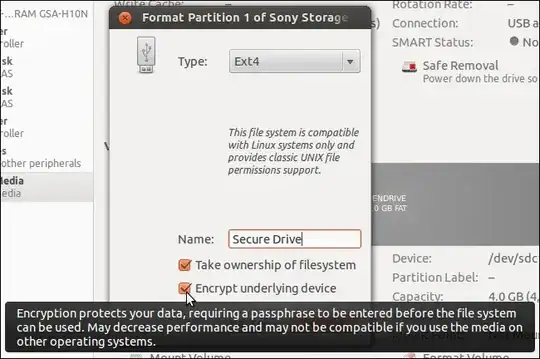How secure is the encryption offered by ubuntu (using the disk utility)? What algorithm is used underneath it?
If someone could at least provide a link to some documentation or article regarding that I would be very grateful.
Reference:

How secure is the encryption offered by ubuntu (using the disk utility)? What algorithm is used underneath it?
If someone could at least provide a link to some documentation or article regarding that I would be very grateful.
Reference:

In a word: sufficient.
This is block-level encryption, so it is filesystem-independent.
Ubuntu's transparent encryption is done through dm-crypt using LUKS as the key setup. The built-in default for cryptsetup versions before 1.6.0 is aes-cbc-essiv:sha256 with 256-bit keys. The default for 1.6.0 and after (released 14-Jan-2013) is aes-xts-plain64:sha256 with 512-bit keys.
For older versions of cryptsetup:
And with newer versions of cryptsetup:
plain or plain64 is fine), and half of your key is used by XTS, meaning your original key must be twice as long (hence 512-bit instead of 256-bit). plain truncates that to 32-bit. Certain chaining modes such as XTS don't need the IV to be unpredictable, while modes like CBC would be vulnerable to fingerprinting/watermarking attacks if used with plain IVs.Other options not used by default
Altogether, this makes for a pretty tight system. It isn't the absolute best system theoretically possible, but it's pretty close. You should be able to trust it in any reasonable circumstances as long as your password is sufficient. Your attacker will almost certainly choose brute-forcing the password as his preferred attack method.
According to the following link, and other sources I have read elsewhere, the default encryption used by Ubuntu for full disk encryption is AES-256:
How secure is an encrypted LUKS filesystem?